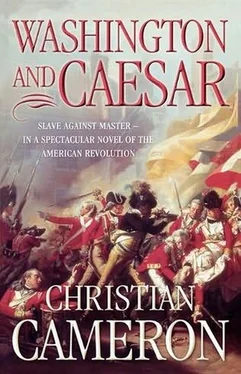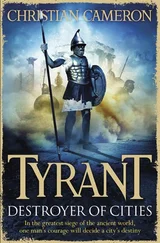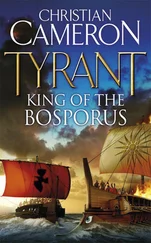Christian Cameron - Washington and Caesar
Здесь есть возможность читать онлайн «Christian Cameron - Washington and Caesar» — ознакомительный отрывок электронной книги совершенно бесплатно, а после прочтения отрывка купить полную версию. В некоторых случаях можно слушать аудио, скачать через торрент в формате fb2 и присутствует краткое содержание. Год выпуска: 0101, ISBN: 0101, Издательство: HarperCollins, Жанр: Исторические приключения, на английском языке. Описание произведения, (предисловие) а так же отзывы посетителей доступны на портале библиотеки ЛибКат.
- Название:Washington and Caesar
- Автор:
- Издательство:HarperCollins
- Жанр:
- Год:0101
- ISBN:9780007389698
- Рейтинг книги:3 / 5. Голосов: 1
-
Избранное:Добавить в избранное
- Отзывы:
-
Ваша оценка:
- 60
- 1
- 2
- 3
- 4
- 5
Washington and Caesar: краткое содержание, описание и аннотация
Предлагаем к чтению аннотацию, описание, краткое содержание или предисловие (зависит от того, что написал сам автор книги «Washington and Caesar»). Если вы не нашли необходимую информацию о книге — напишите в комментариях, мы постараемся отыскать её.
Washington and Caesar — читать онлайн ознакомительный отрывок
Ниже представлен текст книги, разбитый по страницам. Система сохранения места последней прочитанной страницы, позволяет с удобством читать онлайн бесплатно книгу «Washington and Caesar», без необходимости каждый раз заново искать на чём Вы остановились. Поставьте закладку, и сможете в любой момент перейти на страницу, на которой закончили чтение.
Интервал:
Закладка:
He wanted to catch them before Robinson’s men took them. They were headed directly into the Loyal Americans over the ridge, and he didn’t want the mess of their being prisoners. He didn’t want the chance of escape. He wanted Bludner dead. He ran a little faster, still saving some for the last gasp. He was utterly confident in his running. He could run very fast, and he could run forever.
He flew over the ground, and as he crested the next gentle rise he saw them clearly, Bludner ahead and moving well, and the other man slower and laboring. Caesar looked over his shoulder and saw Virgil coming along, his face gray with effort. Caesar stretched into a long sprint, angling a little as he came down the slope. The other man looked back at Caesar and swerved. Then he stopped, clearly done in by the run, and raised his musket. Caesar ran on. If this man was loaded, then Bludner had tried a shot at Stewart and was empty, because neither of them had had time to load. The man aimed carefully and Caesar could see his arms trembling with the effort and he swerved to make the man re-aim. Caesar saw the puff of smoke and heard the report, but not the bullet. The man was too spent to aim well, which was what Caesar had expected. Caesar ran directly at him, bowled him over at full speed and ran on. The man was thrown aside.
“Finish him, Virgil!” Caesar shouted, and ran on, feeling the fatigue in his thighs. But Bludner was flagging too and Caesar got his round loaded and then began to sprint, catching up with every stride. Bludner looked back twice, and then, with a hundred paces between them, he stopped and began to load. Caesar leapt a low stone wall and dashed forward, watching Bludner’s loading warily. At fifty paces, Bludner was just putting the ball in the barrel, but he surprised Caesar by rapping the musket on the ground to get the ball down the barrel, taking aim and firing in one motion. Caesar barely had time to swerve, and even then he heard the sound of the bullet close, but the report sounded odd, and Bludner threw the musket down, the side of his face burned and black. Bludner drew a heavy sword, breathing like a bellows. Caesar slowed a little and ran past him, breathing easily. He ran until he was between Bludner and Robinson, still a mile or more to the west, and then he stopped.
“You black bastard,” Bludner said, seeing Caesar clearly. “You’ve vexed me before.”
Caesar saw Virgil in the distance, just finishing the man he had knocked down. Although he had the fowler loaded, he placed it carefully on the ground, lock up, and smiled, a thin-lipped grin that showed no teeth. Then he stepped back and drew his hunting sword and began to circle Bludner to the left, drawing Jeremy’s little dagger with his left hand and keeping it close to his side. He relished the fear in Bludner’s eyes, and the way Bludner was edging toward the fowler on the ground. He had seldom felt so alive. He breathed deeply.
Bludner leapt at him with a roar and cut at his head, and Caesar parried easily. He stepped back. Bludner took several deep breaths and cut at him again, an overhand motion that left his side exposed. Caesar noted it and his smile grew. He stepped back again, drew the same attack, met it with the same parry.
“Try harder,” he said. Bludner stepped to his right and attacked, one-two, head cuts from opposing sides, and Caesar parried them both. Then his heel caught a branch and there was a rush of action, Bludner trying to bowl him over, his own total contortion as he fought his own body for balance and got a knee under him and his sword up to catch another of Bludner’s single-minded blows. Caesar stood up, feigned a little twinge, and made as if to stumble back. Bludner brought his wrist up and cut again, the same side, and Caesar parried, stepped in close and slammed Jeremy’s little ivory-handled dirk right up under Bludner’s right armpit.
Bludner stepped back and fell immediately, although he was on his feet in a second. Then he swayed.
“That’s for Jeremy,” said Caesar, and then, as if to himself, “You are easy.”
Bludner waved his blade and said something, and Caesar killed him, a simple feint and a cut to the neck, his whole weight and all his anger, his whole life in one cut, and Bludner fell with a crash, head rolling in the dirt.
He cleaned his blade, took the man’s dispatch case and his rifle, and picked up his own fowler. He looked at Bludner’s body and shook his head.
Virgil came up, still in obvious pain from his arm.
“You killed him.” He smiled broadly through his own pain. “I knew you would.”
“He was easy,” Caesar said simply. “I thought he’d be something…”
Virgil just nodded. “Ain’t it always like that, though?”
They stood together, savoring the early autumn air and Bludner’s shocking corpse, and then they began to run back to the rest of the Guides.
VI
Peace hath her victories
No less renowned than war.
MILTON, “TO THE LORD GENERAL CROMWELL”“Is it your opinion,” said Socrates, “that Liberty is a fair and valuable possession?”
“So valuable,” replied Euthydemus, “that I know of nothing more valuable.”
XENOPHON’S MEMOIRS OF SOCRATES, AS TRANSLATED BY SARAH FIELDING, 17621
Near Dobb’s Ferry, May 6, 1783
Guy Carleton was dressed in the full uniform of a British major general, with a scarlet coat whose glare of color was accentuated by the dark blue of his cuffs and collar. The buttons were gold, as was the metallic lace that surrounded each buttonhole. The effect of the whole should have been stunning, but Carleton himself was a cold man at the best of times, and today, quietly enraged, he exuded a chill that could be felt by all the men at the table opposite him. Carleton was almost alone, accompanied only by his military secretary, who wrote quickly whenever either party spoke.
This is almost as pleasurable as Yorktown, thought Washington with an inward smile that never passed out on to his calm face. Years of defeat and deprivation only served to make the years of victory all the sweeter. That Carleton deeply resented Washington’s insistence that he should sit here unaccompanied, unescorted, with none of the civilities of war that one general could pay another, was simply the reaping of a harvest of indignity that the British had heaped upon him over the last eight years. Washington was not alone. He was accompanied by his entire staff, and a number of senior officers and representatives of the Continental Congress, who had provided the list of new demands, ancillary to the signed treaty prepared in Paris.
Washington was aware that the forcing of demands after the signature of a treaty was an ungentlemanly business, but he chose, repeatedly, and in defiance of the advice of some of his closest officers, to function as the servant of the Congress and not its master. He looked down the list.
“General Carleton, the next two items deal with the repatriation of British prisoners of war, taken at Saratoga and Yorktown and other such actions.”
Carleton sat unflinching. His face might have been carved from wax. He gave a very slight nod.
Washington read through the first item again, disliking it. Hamilton and Lafayette had both advised him to ignore it, but Washington knew that it was important to the southern colonies and that it was a reprisal for Great Britain’s insistence that the Tories, or Loyalists, be reimbursed for property seized or destroyed during the war by servants of the Congress. A functionary from the Congress began to read.
“The Congress of the United States has come to understand that there are at present some thousands of blacks in New York City, who have served the king under arms or in various other capacities. These persons are the legal property of citizens of the United States, and must be returned.”
Читать дальшеИнтервал:
Закладка:
Похожие книги на «Washington and Caesar»
Представляем Вашему вниманию похожие книги на «Washington and Caesar» списком для выбора. Мы отобрали схожую по названию и смыслу литературу в надежде предоставить читателям больше вариантов отыскать новые, интересные, ещё непрочитанные произведения.
Обсуждение, отзывы о книге «Washington and Caesar» и просто собственные мнения читателей. Оставьте ваши комментарии, напишите, что Вы думаете о произведении, его смысле или главных героях. Укажите что конкретно понравилось, а что нет, и почему Вы так считаете.












